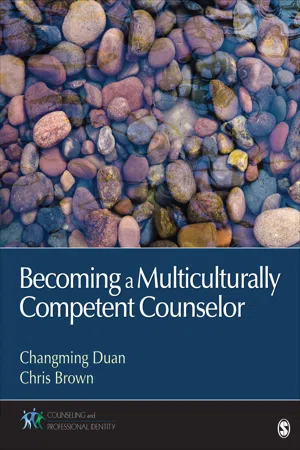
- 456 pages
- English
- ePUB (mobile friendly)
- Available on iOS & Android
Becoming a Multiculturally Competent Counselor
About this book
Organized around the latest CACREP Standards, this timely book covers the core concepts, theories, and skills of multicultural and social justice counseling. With a focus on helping readers develop their multicultural professional identities, the authors conceptualize multicultural identity development as the foundation for comprehending the pervasive impact of social privilege and oppression and developing competencies to effectively work with the culturally diverse. Case illustrations, exercises, and an emphasis on reflective practice foster a true understanding and application of concepts.
Becoming a Multiculturally Competent Counselor is part of the SAGE Counseling and Professional Identity Series, which targets specific competencies identified by CACREP (Council for Accreditation of Counseling and Related Educational Programs).
Frequently asked questions
- Essential is ideal for learners and professionals who enjoy exploring a wide range of subjects. Access the Essential Library with 800,000+ trusted titles and best-sellers across business, personal growth, and the humanities. Includes unlimited reading time and Standard Read Aloud voice.
- Complete: Perfect for advanced learners and researchers needing full, unrestricted access. Unlock 1.4M+ books across hundreds of subjects, including academic and specialized titles. The Complete Plan also includes advanced features like Premium Read Aloud and Research Assistant.
Please note we cannot support devices running on iOS 13 and Android 7 or earlier. Learn more about using the app.
Information
Section 1 Professional Counseling: A Cultural Occurrence
- Recognize the monocultural nature of extant counseling theories and practices (Chapter 1)
- Understand the necessity for counselors in the 21st century to develop a multicultural professional identity (Chapter 1)
- Understand how the counseling profession has historically failed in providing culturally just and fair services to the socially oppressed and the culturally diverse (Chapter 2)
- Understand the negative impact of racism, discrimination, sexism, power, privilege, and oppression on many individuals in our society and on counseling practice (Chapter 2)
- Be knowledgeable of the multicultural movements and advances in the counseling profession in recent years (Chapter 3)
- Recognize the demand and need for the counseling profession to transform itself in order to effectively serve the socially oppressed and culturally diverse (Chapter 3)
1 Monocultural Context of Counseling as a Helping Profession
Not to know is bad; not to wish to know is worse.—West African Proverb
Chapter Overview
Self-Assessment of Pre-Existing Awareness and Knowledge
- What is my understanding of the cultural foundation of the counseling profession?
- What are the values of the counseling profession that are consistent or inconsistent with my own?
- How do I perceive people who are racially, ethically, socially, or culturally different from me?
- What thoughts do I have about the multicultural movement in the field of counseling?
- In what way am I prepared (or not prepared) to emotionally and intellectually engage in the helping relationship with clients from socially oppressed and marginalized groups (e.g., lesbian/gay/bisexual/transgender clients)?
- What challenges might I encounter in trying to develop a multicultural professional identity?
- How might I demonstrate my commitment to developing a multicultural consciousness?
Learning Objectives
- Recognize the counseling profession as a culture-laden practice
- Describe the cultural values and worldviews on which extant counseling theories are based
- Understand why it is unprofessional, nontherapeutic, and unethical to practice counseling without considering clients’ cultural contexts
- Self-assess their interest and motivation for intellectual and emotional engagement in multicultural learning
- Understand the necessity of developing a multicultural professional identity and multicultural competencies
Case Illustration 1.1
The Case of Xilin
Table of contents
- Cover
- Publisher Note
- Acknowledgements
- Half Title
- Acknowledgements
- Title Page
- Copyright Page
- Contents
- Editors’ Preface
- Preface
- Acknowledgments
- About the Authors
- Section 1 Professional Counseling: A Cultural Occurrence
- 1 Monocultural Context of Counseling as a Helping Profession
- 2 Demands for Multicultural Professional Counseling
- 3 Multicultural Movement: The Fourth Force
- Section 2 Counseling in the 21st Century: A Multicultural Phenomenon
- 4 Multicultural Contexts of Professional Counseling in the 21st Century
- 5 Redefining and Renewing the Counseling Profession in the 21st Century
- Section 3 Becoming Multiculturally Competent
- 6 Developing a Multicultural Identity
- 7 Understanding Social Oppression and Cultural Pluralism
- Section 4 Exercising Multicultural Competencies: Working With the Culturally Diverse
- 8 Working With Diversity in Racial, Ethnic, and Nationality Contexts
- 9 Working With Diversity in Gender and Sexual Orientation Contexts
- 10 Working With Diversity in Social Class Contexts
- 11 Working With Diversity in Physical Ability
- 12 Working With Diversity in Religion and Spirituality
- Section 5 Social Justice and Multicultural Counseling
- 13 Role of Social Justice in Counseling
- 14 Developing Social Justice Counseling and Advocacy Skills
- Section 6 Applying Multicultural Competencies: Case Examples
- 15 Helping Jermaine Feel “Normal”
- 16 Helping Darryl and Samar to “Fight Fairly”
- Epilogue: From the Authors’ Chairs
- Index